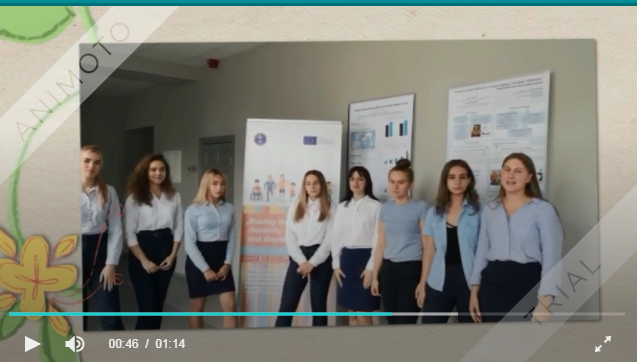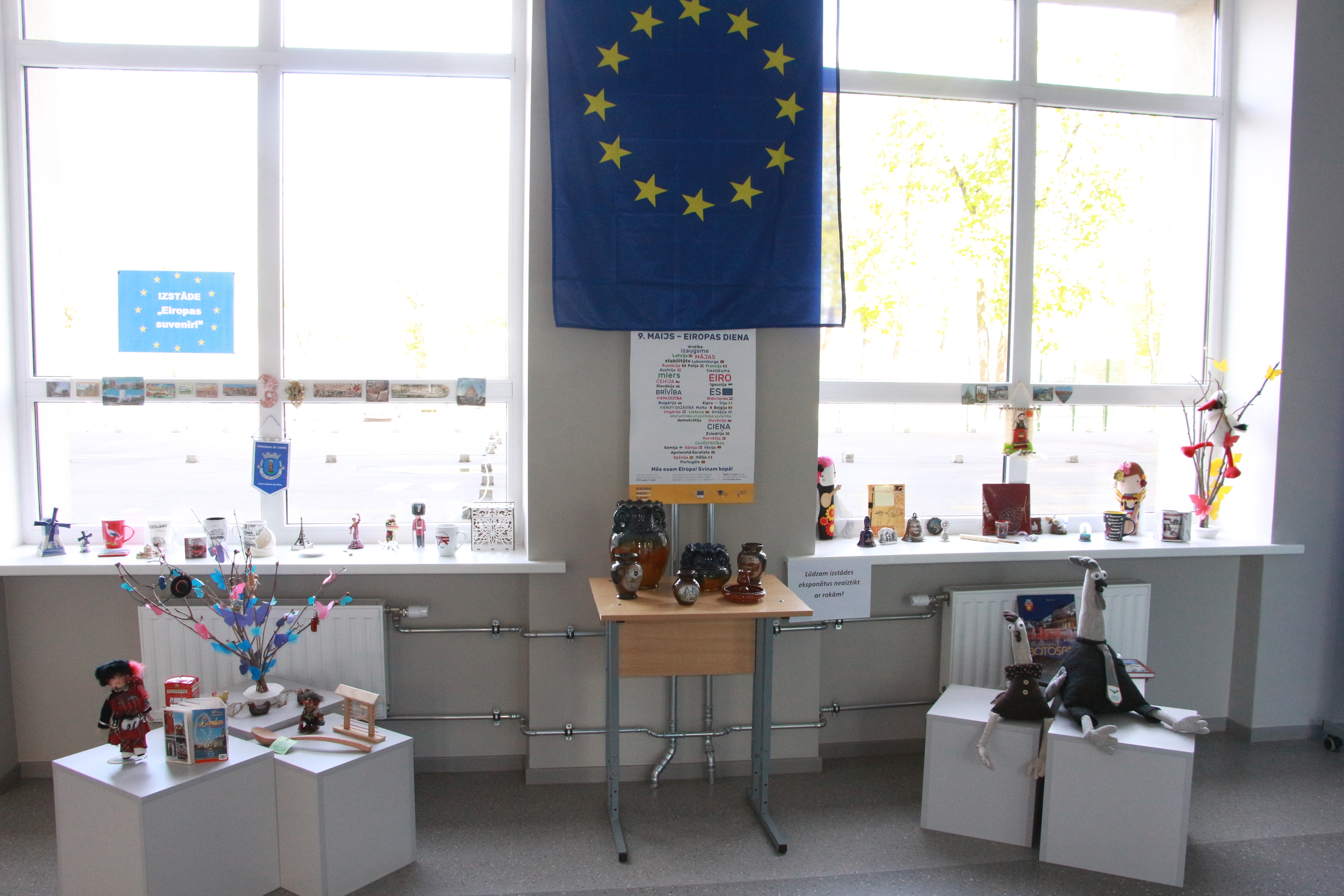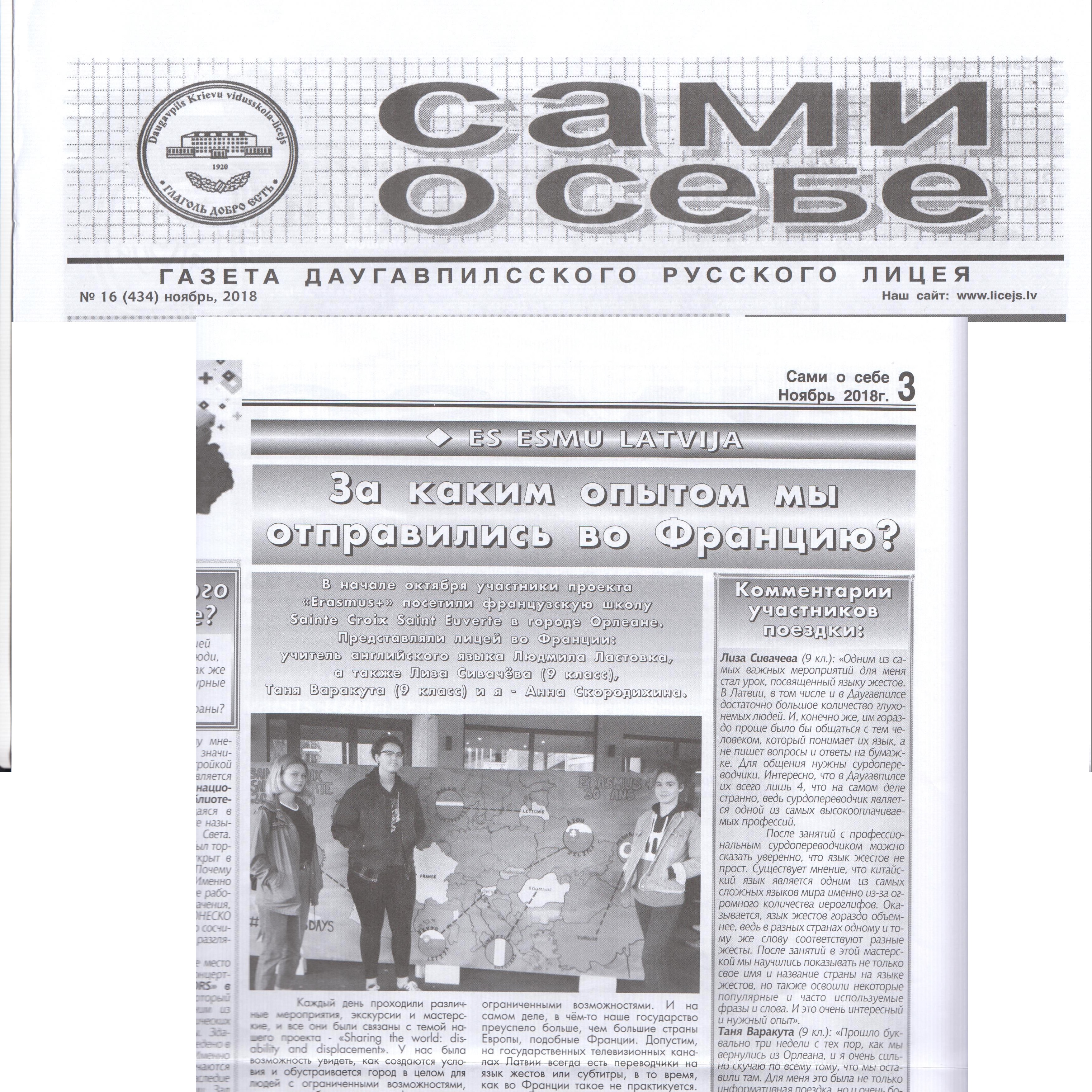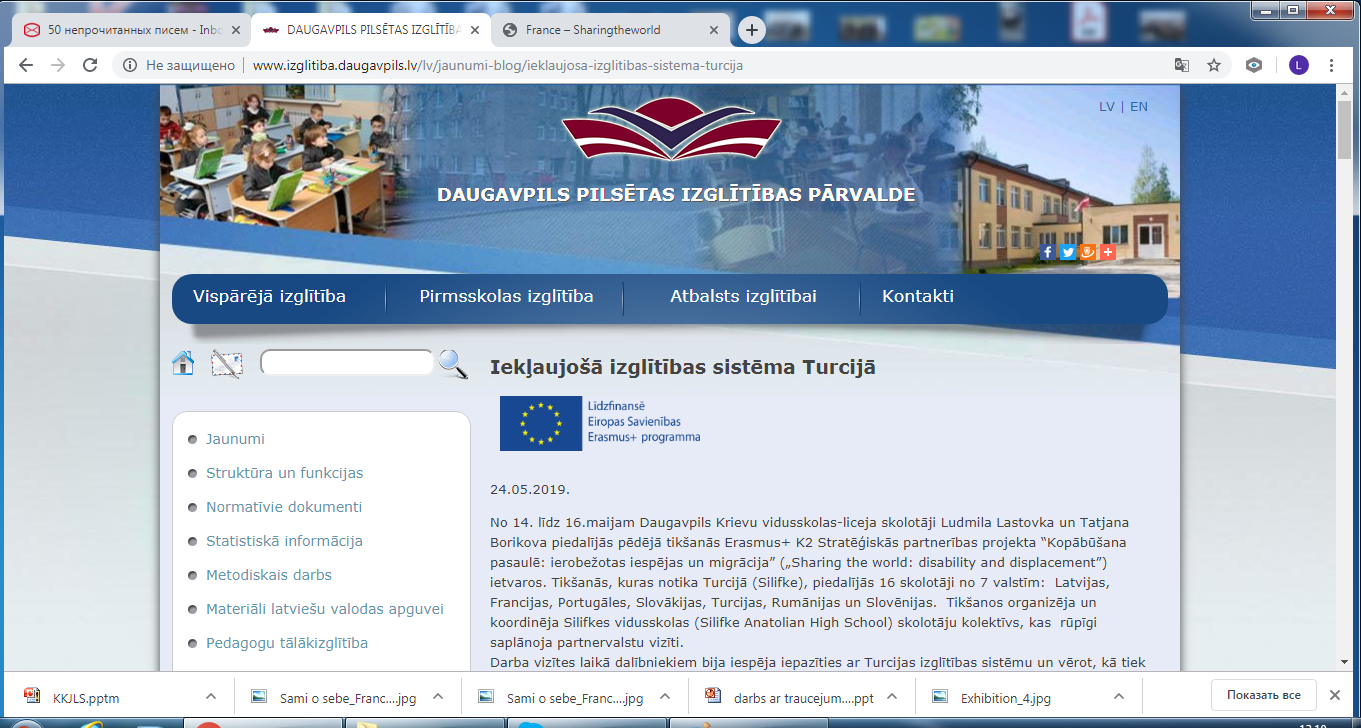 |
 |
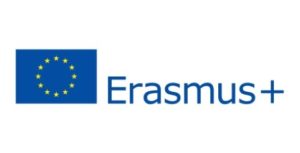 |
SHARING THE WORLD* : Disability and Displacement 2017 – 2019
*this project is financed by the European Union
REFUGEE LOOKING FOR A JOB
COUNTRY of DESTINATION : Latvia
GENERAL INFORMATION
Survey “Jobs for disabled/ displaced people in Latvia”
- A few years ago, one of the Latvian customer service centers took part in the European project on employment of disabled people and recruited several disabled people. The result surpassed all expectations of the leadership. The new employees turned out to be so good employees that they are still working at the enterprise.
- «It took 5 or 6 years, and these people have worked with us until now.We did not expect. We were very impressed by the attitude of other employees towards them. They became so friendly; they are so attentive to them – amazing. After work they always help them to reach the parking lot and get into the car». -shared a representative of Telecom.
- How many enterprises participate in the fair, have not yet been considered. It is known; that in Riga this number – extremely small: only five companies are ready to open their doors to the disabled.
- Now, every tenth job applicant in Latvia is a person with a disability. In Minblag any more the first year are engaged in their employment, implementing a program of subsidized jobs.Every year, it spends from 5 to 5.5 million euros.
- “After subsidized jobs, approximately 80-85% of people remain at the same jobs, from the same employer. This means that employers are satisfied with these workers and extend their employment relationships. In most cases, this is unskilled work, » -confessed representative MinblagImant Lipskis.
- It is planned that through social entrepreneurship, during the next 6 years, at least 200 to 500 jobs will be created.Also redistributing finance from other projects, additional money will receive a program of subsidized seats.As a result, it is planned to include 20% more disabled people on the labor market in comparison with previous years.
- Company «Apeirons» provides various services to help people with disabilities integrate into society.People with disabilities are provided with various courses and training materials, as well as support in finding a job. Apeirons also advises potential employers on the needs of people with disabilities.
“Refugee Looking for a Job”
- Half of the largest companies in Latvia are ready to give work to refugees, and small businesses are much less responsive, according to the results of the survey, conducted by order of the bank “Citadele”.
- The most responsive are large enterprises (from 250 and more employees) – 56% of them are ready to offer work for refugees. Relatively friendly attitude to refugees from the company with a number of 50 to 249 employees- 41% of such enterprises are ready to give work to persons, which need asylum. In the category of enterprises from 10 to 49 employees – 29% of entrepreneurs are ready to accept refugees,and in the group of small enterprises (up to 10 employees) – 14%.
- In the regionalsection, refugees have the highest chances in Vidzeme and in Zemgale, where 26% of enterprises expressed their readiness to employ them. In its turn, in Kurzeme and in Riga`s region – 16% of people would agree to give work for refugees.
- Refugees are least chances to get a job in Riga and in Latgale, where only 14% and 6% of entrepreneurs are ready to provide thema
- For today, our government has undertook to relocate 776 people (out of 160 thousand), but legally this decision was made against 531 people (481 – from Italy and Greece, plus 50 – from Turkey) – until September next year, we must accept them.
- For now, only 73 people have come to the EU solidarity program – inconspicuous for locals.
- The average number of requests for the EU per million inhabitants is 599. In Latvia, it is 46.
- 3% of the population do not support the adoption of refugees in Latvia, writes the newspaper «Neatkarīga», referring to the survey data, which was held on at the end of last year.
 |
 |
 |
SHARING THE WORLD* : Disability and Displacement 2017 – 2019
*this project is financed by the European Union
REFUGEE LOOKING FOR A JOB
COUNTRY of DESTINATION : LATVIA
GENERAL INFORMATION
Number of refugees present in the country :
- Nowadays in Latvia have 374 registered refugees out of 531.
Nationalities/ethnic groups present in the country (in percentage) :
- According to the centus of population in 2011 Latvians make up 62,1% of the total population, Russians – 26,9%, Belarusians – 3,3%, Ukrainians and Poles – 2,2% (each), Lithuanians – 1,2%, Jewry and Gypsies – 0,3% (each), Germans and Estonians – 0,1% (each) and other – 1,3%
Languages spoken in the country :
Length to get the refugee status :
- Length to get the refugee status may lost from 3 to 6 months.
Attitude towards existing foreign communities/minorities in the country :
- Latvia has specific demographic features relating to the ethnic make-up of its population as well as a specific policy towards national minorities and inter-ethnic relations, with the result that it has been a focus of attention at the Council of Europe since it joined in 1995, but also in other international organisations. 59% of the 2.3 million inhabitants are Latvians and 41% from different ethnic minorities, Russians making up about 28.5% of the whole population. Given this multi-ethnic and multi-cultural character of Latvian society, the establishment of a cohesive society and reliable civic nation raises enormous challenges.
- Latvia is a stable, modern, democratic country which, in the framework of the integration policy put in place several years ago, is moving at its own speed towards the resolution of its problems, some of which – such as the fate of non-citizens – are structural. There are no real inter-community problems. Especially since, now the country has joined the EU, public opinion seems to be focusing more on the economic and social situation than on identity questions.
Access to healthcare : easy / average / complicated / very complicated
- Access to health care a refugee who has received official status has exactly the same as a citizen of Latvia.
THE JOB MARKET:
In what domain we can easily find a job :
- In Latvia, refugees work in industries that do not require knowledge of the Latvian language at such a high level as in other industries, in construction, woodworking and food industries or in the passenger transport industry. In fact, almost all areas except for governmental jobs, such as police, state government, etc.
- Half of the largest companies in Latvia are ready to give work to refugees, and small businesses are much less responsive, according to the results of the survey, conducted by order of the bank “Citadele”.
- The most responsive are large enterprises (from 250 and more employees) – 56% of them are ready to offer work for refugees. Relatively friendly attitude to refugees from the company with a number of 50 to 249 employees- 41% of such enterprises are ready to give work to persons, which need asylum. In the category of enterprises from 10 to 49 employees – 29% of entrepreneurs are ready to accept refugees, and in the group of small enterprises (up to 10 employees) – 14%.
What diplomas are the most required :
A person submits to the information institution:
- an application;
- copy of passport;
- documents approving education and professional rights in profession;
- certificate from competent home institutions on rights to exercise profession;
- certificate on work experience in home state;
- a certificate of good conduct (doctors, nurses, dentists, midwives, pharmacists, architects, veterinary surgeons) not more than 3 months old.
Documents which are not in Latvian should be translated into Latvian. Documents issued outside EU (except Russia, Ukraine, Uzbekistan, Belarus, Kirgyzstan, Moldova) should be legalized in Latvia.
How difficult is the language of the country :
- Refugees learn Latvian very slowly and with difficulty, as they arrived to Latvia from countries whose culture and languages are very different from Latvia.
Can we find a job if we speak English but not the native langage :
- Previously, employers were very careful to hire these people, but, having seen their knowledge and skills, take them to work more often.
INTEGRATION
What is the general attitude towards refugees :
- Stereotypes, distrust, fear and hostility towards outsiders – this is how the attitude of a significant part of Latvian society can be described. The locals do not expect anything good from them either. And with each new terrorist attack, negative news or a state of emergency in the society there is a growing wave of hostility towards refugees. But like it or not, we’re going to have to change our minds.
Are the people in the country welcoming to strangers :
- According to the January survey of the sociological company , 78,3% of residence oppose the reception of refugees. Over the last months in Riga six protests related to the expected arrival of refugees.
Are there any associations/organisations that can help (Red Cross or others) :
- The Red Cross is the only organization in Latvia that has agreed to accept refugees.
Organization “Shelter “safe house”” deals with citizens who already have in Latvia some status.
What is the official attitude of the government about the migrants : welcoming/unwanted
- For some ruling politicians – for example, the nationalist party “national Association” – the question of the reception of refugees and does is one of the Central policy issues around which eventually built negotiations on the formation of a coalition.
- For today, our government has undertook to relocate 776 people (out of 160 thousand), but legally this decision was made against 531 people (481 – from Italy and Greece, plus 50 – from Turkey) – until September next year, we must accept them.
- For now, only 73 people have come to the EU solidarity program – inconspicuous for locals.
- The average number of requests for the EU per million inhabitants is 599. In Latvia, it is 46.
This document was prepared by : Jelizaveta Sivachova, Emiliya Kolesnika, Anna Skorodihina
Resources :
« Rights of national minorities in Latvia » http://assembly.coe.int/nw/xml/XRef/X2H-Xref-ViewHTML.asp?FileID=11490&lang=en#2i
 |
 |
 |
SHARING THE WORLD* : Disability and Displacement 2017 – 2019
*this project is financed by the European Union
REFUGEE LOOKING FOR A JOB
COUNTRY of DESTINATION : United Kindom
GENERAL INFORMATION
Number of refugees present in the country : Net immigration was 318,000 for the year 2014, a 52 percent increase from 2013.
Since the EU referendum in late June 2016, the estimated number of EU nationals immigrating to the UK fell from 284,000 the year before the vote to 223,000 in the year after. This figure has picked up slightly for the year 2017 as a whole though—240,000.
Around 3.8 million people living in the UK in 2017 were citizens of another EU country. That’s about 6% of the UK population, although these figures exclude people who live in communal establishments. Similarly, 6% of the UK population were born in another EU country.
Around 2.3 million nationals of other EU countries are in work, as of January to March 2018. That’s about 7% of people in work—it has stayed at roughly the same, historically high, level since mid-2016.
EU nationals of working age are more likely to be in work than UK nationals and non-EU citizens. About 82% of working age EU citizens in the UK are in work, compared to around 76% of UK nationals and 63% of people from outside the EU.
Nationalities/ethnic groups present in the country (in percentage) :The UK population is made up of different ethnicities. 87% of people are White, and 13% belong to a Black, Asian, Mixed or Other ethnic group.
Languages spoken in the country : official language: British English; nationalities/ethnic groups spoken languages.
Length to get the refugee status :Your application will usually be decided within 6 months. It may take longer if it’s complicated, for example:
- your supporting documents need to be verified
- you need to attend more interviews
- your personal circumstances need to be checked, for example because you have a criminal conviction or you’re currently being prosecuted
Ask your legal adviser if you want an update on your application.
You’ll be given or refused permission to stay in one of the following ways.
Attitude towards existing foreign communities/minorities in the country : 77 % of the UK population wants immigration to be reduced in general, and 56 percent of those people want immigration to be “reduced a lot.”
Access to healthcare : easy / average / complicated / very complicated
THE JOB MARKET:
In what domain we can easily find a job : If you’re ready to look for work, you can search online.
If you’re in London, the Refugee Council’s employment advice and support service have a course that will help you if you’re not quite sure where to start.
What diplomas are the most required : If you have qualifications from your home country – you’ll need to find their UK equivalent to find a similar job here.
How difficult is the language of the country :
« In fact, how hard it is to learn depends on what your native language is; and this follows as languages are more (or less) closely related to one another; if your mother tongue is more similar, in terms of sounds, vocabulary and grammatical patterns to another–for instance you’re a speaker of Dutch or German–then English will be easier to learn. But if you speak a language that comes from a more distantly related tongue–say Japanese–then English is more likely to prove a tougher nut to crack. » said Vyvyan Evans, Ph.D., an expert in language, communication, and mind.
Can we find a job if we speak English but not the native language : Yes
INTEGRATION
What is the general attitude towards refugees : 77 percent of the UK population wants immigration to be reduced in general, and 56 percent of those people want immigration to be “reduced a lot.”
Are the people in the country welcoming to strangers : Not so much
Are there any associations/organisations that can help (Red Cross or others) :
- Asylum Aidprovides free legal advice and representation to refugees and asylum seekers as well as advocating on their behalf.
- Asylum Helpprovides free independent advice and guidance to asylum seekers across the UK.
- British Red Crossoffers support for refugees and asylum seekers in the UK and abroad as one of their services.
- City of Sanctuaryis a movement committed to building a culture of hospitality and welcome, especially for refugees seeking sanctuary.
- Detention Actionsupports people in UK detention centres and campaigns on their behalf.
- Freedom from Tortureis a medical foundation for the care of victims of torture.
- Helen Bamber Foundationcares for and gives advice to survivors of human rights violations.
- Jewish Council for Racial Equalityengages the Jewish community in social action, focusing on race equality and justice for refugees and asylum seekers.
- Refugee Actionsupports refugees throughout the world with basic provisions when they arrive in a country.
- Refugee Councilworks with refugees and people seeking asylum in the UK through practical support and advice.
- Refugee Support Networkhelps young refugees and survivors of trafficking to build more hopeful futures through education.
- Rene Cassinis a charity working to promote and protect universal human rights, drawing on Jewish experience and values.
- Student Action for Refugeesis a national charity made up of students welcoming refugees to the UK.
- The Children’s Societywork with some of the most disadvantaged children across the UK including many who are refugees.
- United Nations High Commission for Refugeeshas a mandate to lead and co-ordinate international action to protect refugees and resolve refugee problems worldwide.
- World Jewish Reliefis the UK Jewish community’s international humanitarian agency.
What is the official attitude of the government about the migrants : welcoming/unwanted
This document was prepared by :TatyanaVarakuta
Resources :
https://fullfact.org/immigration/eu-migration-and-uk/


